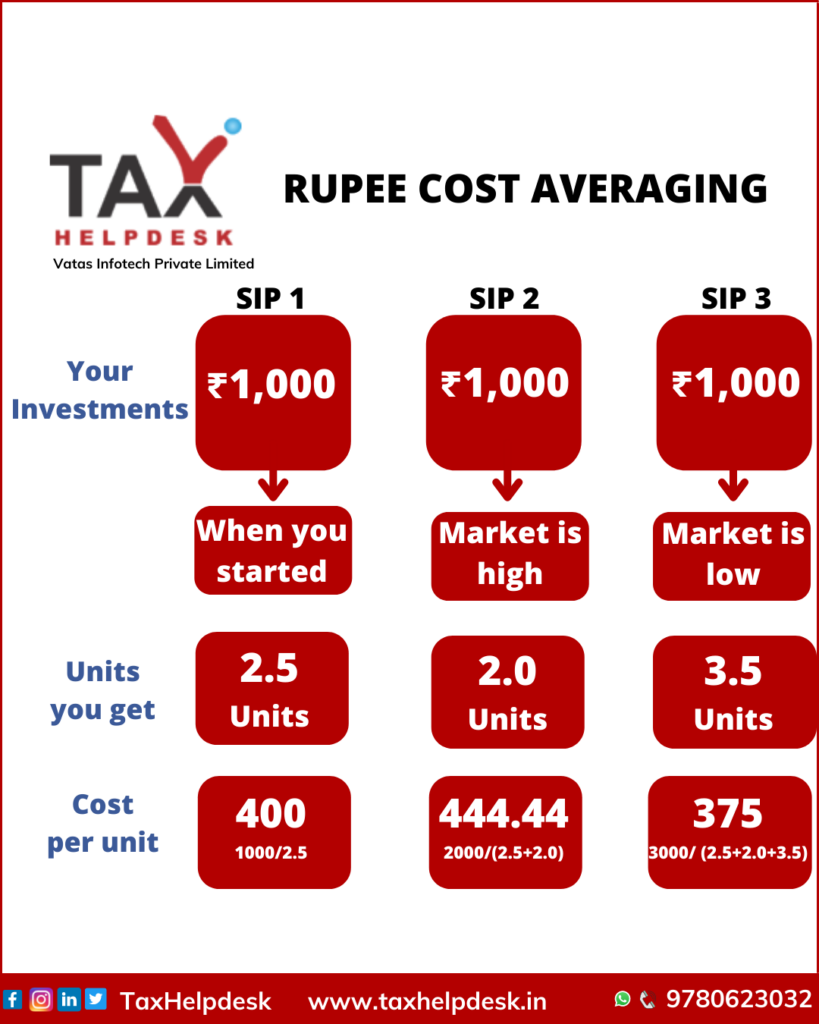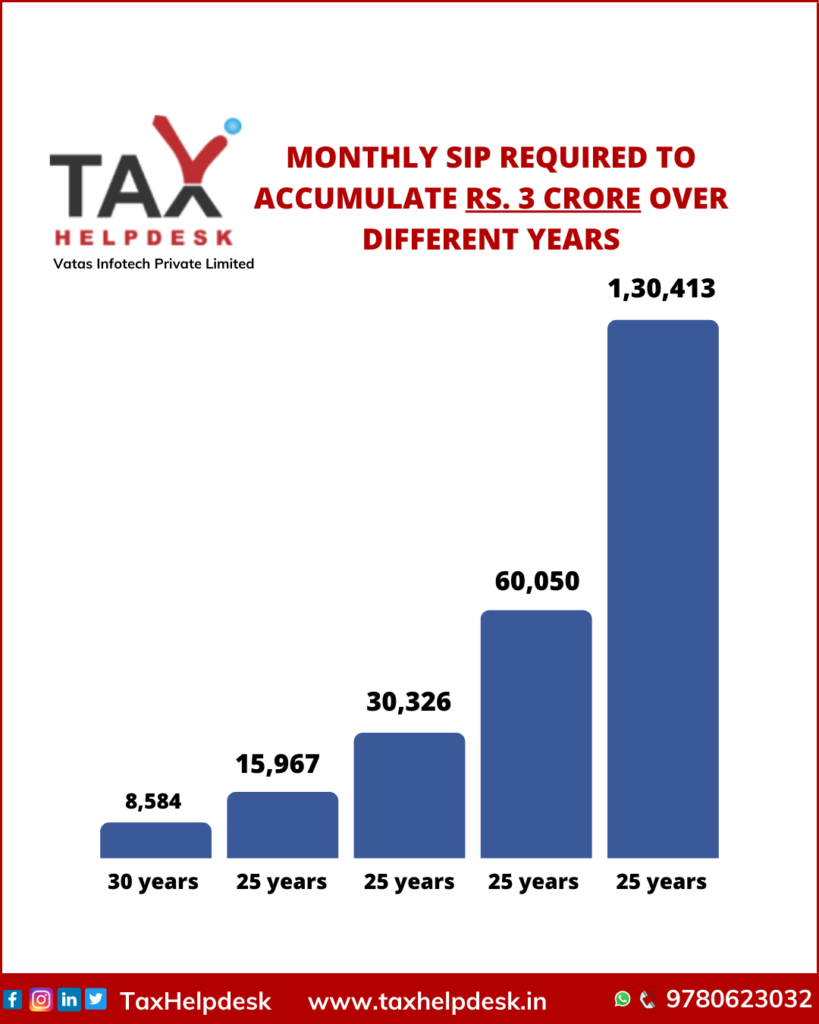What is SIP?
Systematic Investment Plan, most popularly known as SIP is an investment plan that allows you to invest small sum in your preferred mutual fund in a disciplined manner. Through SIP, a fixed amount of money is invested in fixed intervals in the selected mutual fund scheme. This fixed interval can be on weekly/monthly/quarterly/semi-annually or annual basis.
Know How Does Systematic investment plan Work?
SIP works on the principle of periodic and consistent investments, similar to recurring deposit account in banks. The investment amount can be auto-debited from your bank account on the basis of standing instructions, and accordingly, the corresponding amount of mutual fund units are allocated to you.
Note:
The number of units received depends on the scheme’s current Net Asset Value (NAV)
By investing in mutual funds through SIP, you are not required to wait for the market to grow. This is so because the investors who invest through SIP get benefits from both bullish and bearish market trends. When the market is down, you purchase more fund units. On the other hand, fewer units are bought when the market is flourishing.
Also Read: Taxability of Capital Assets in India
SIP is Goal Based Investing
By investing in mutual funds through SIP, you work towards the following goals:
– Retirement Planning
Retirement planning is not an option and should be planned from the early stage itself. By investing in mutual funds through SIP, you not only get financial independence but it also keeps secure for your retirement days.
For instance, in India, the current inflation rate is 4.54%. If a nuclear family needs Rs. 20,000 for monthly expenses today, they will need more than Rs. 70,000 a month after 30 years. Therefore, planning for retirement should not be postponed and one should start early and investing in funds through SIP is the best option to do so.
– Plan for dream home
Owning a house in one’s own name is everyone’s dream. For buying a house even on home loan, one has to make 10-25% amount as down payment. But from where to get this down payment amount? In order to make payment, one must again start investing early through SIP in mutual funds. When you invest through SIPs for medium to long-term investment horizon, the power of compounding comes into play, which assists in building the desired corpus. Therefore, you not own a house in your name but also have less liabilities to take care of.
Also Read: Tax Benefits on Purchasing House Through Home Loan
– Plan for vacation
The though of going for a vacation brings a broad smile on everyone’s face but traveling too, requires a lot of money. However, you can easily manage your traveling expenses and plan for vacation if you invest in mutual funds through SIP without depleting your regular savings.
– Plan for child’s education
Planning for child’s education is an inevitable part in the life of an individual. If you invest the amount the amount in mutual funds through SIP, then you can collect funds for child’s education with ease and without having much burden on your pocket. This is so because the amount is invested in small portions at regular intervals and not in one go.
– Plan for child’s marriage
After the child’s education, the next important factor in individual’s life is to save money for his child’s marriage. No matter how small or big the marriage function is, the funds are needed. If you want that you do not have to break your fixed deposits at the time of your child’s marriage, then you must start early and start investing in mutual funds through SIP. Having stated that, SIP is an easy way to accumulate the funds over the time.
How to calculate Future Value on Investment through SIP?
The formula for calculating future value on investment through SIP is
FV = P [ (1+i)^n-1 ] /i * (1+i)
FV = Future value or the amount you get at maturity
P = Amount you invest through SIP
i = Compounded rate of return
n = Investment duration in months
r = Expected rate of return
Illustration
Take an example where you invest Rs 1,000 per month for a tenure of 12 months.
You expect a 12% annual rate of return (r)
You have i = r/12 = 12%/12 = 0.01
FV = 1000 * [(1+0.01) ^ 12 – 1] /0.01 * (1+0.01)
You get Rs 12,809 at maturity
Benefits of Investing through SIP
The benefits of investing through SIP are as follows:
– Start with as low as Rs. 100 a month
To invest in mutual funds is not all heavy on pocket. You can start investing in funds through SIP with amount as lows as Rs. 100 a month and increase it slowly and steadily when the time is right.
– Rupee Cost Averaging
The SIP method of mutual funds works on the principle of rupee cost averaging. Under this, you invest a fixed amount of money at regular intervals. Further, the Net Asset Value of all mutual funds are updated on a daily basis, therefore, the cost of purchase may vary from one SIP instalment to another. Accordingly, when the market rates are low, you get to purchase more funds and when the market rates are high, you get to purchase less funds. By investing through SIP, you do not have to study the market for investing. The rupee cost averaging effect – averages out the costs of your units and hence lessens the results of short-term market fluctuation on your investments.

– Power of Compounding
Compounding in mutual funds means the interest earned on the interest or profits earned on the profits from your investments. Therefore, the earlier you start investing in mutual funds, the higher the chances are for you to earn more profit.

– 2x Higher Returns than RD
When we have to choose between SIP and RD, the investments done through SIP are lower as compared to investments made in recurring deposits. Further, the returns generated by SIP mutual funds have given around 12% to 22% growth in the previous 5-10 years and RDs have a fixed rate of return – around 7-8%. Therefore, the mutual funds SIP give 2x higher returns than RD.
Comparison between SIP and One Time Investment
| Particulars | SIP | One Time Investment |
|---|---|---|
| Mode of Investment | Investment is made in installment | Single investment of lump sum amount is made |
| Period | Periodic investment in a tenure | One time investment in a tenure |
| Earning | Earns better even during market lows | Earns better when market is high |
| Security | It can protect investments from potential market crash | It can lead to major loss during market crash which happens often enough |
| Cost of Investment | Less due to rupee cost averaging | High as it is one time large investment |
If you want to know more about SIP or mutual funds or take TaxHelpdesk’s experts consultation, then drop a message below in the comment box or DM us on Whatsapp, Facebook, Instagram, LinkedIn and Twitter. For more updates on tax, financial and legal matters, join our group on WhatsApp and Telegram!
Disclaimer: The views are personal of the author and TaxHelpdesk shall not be held liable for any matter whatsoever!



Pingback: Know About Systematic Investment Plan (SIP) | T...